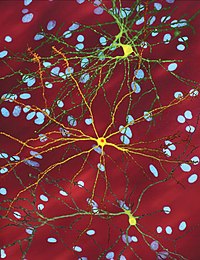
Photo from wikipedia
Huntington's disease (HD) is a rare, incurable, inheritedneurodegenerative disorder manifested by chorea, hyperkinetic, and hypokinetic movements. The FDA has approved only two drugs, viz. tetrabenazine, and deutetrabenazine, to manage the… Click to show full abstract
Huntington's disease (HD) is a rare, incurable, inheritedneurodegenerative disorder manifested by chorea, hyperkinetic, and hypokinetic movements. The FDA has approved only two drugs, viz. tetrabenazine, and deutetrabenazine, to manage the chorea associated with HD. However, several other drugs are used as an off-label to manage chorea and other symptoms such as depression, anxiety, muscle tremors, and cognitive dysfunction associated with HD. So far, there is no disease-modifying treatment available. Drug repurposing has been a primary drive to search for new anti-HD drugs. Numerous molecular targets along with a wide range of small molecules and gene therapies are currently under clinical investigation. More than 200 clinical studies are underway for HD, 75% are interventional, and 25% are observational studies. The present review discusses the small molecule clinical pipeline and molecular targets for HD. Furthermore, the biomarkers, diagnostic tests, gene therapies, behavioral and observational studies for HD were also deliberated.
Journal Title: Bioorganic chemistry
Year Published: 2022
Link to full text (if available)
Share on Social Media: Sign Up to like & get
recommendations!